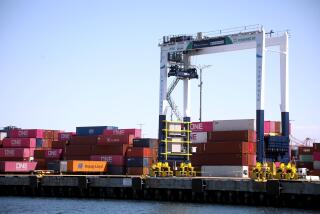Drivers Face ‘Tough Summer,’ Bush Says
- Share via
WEST SACRAMENTO, Calif. — President Bush, who has never had easy relations with environmentalists, combined his oft-stated interest in using technology to reduce the nation’s energy problems with the surge in gasoline prices to deliver an Earth Day declaration on Saturday that warned the nation it would face “a tough summer” because gasoline supplies are already tight.
Speaking in the spotless garage in an industrial park where scientists and technicians are working to develop and maintain cars, buses and trucks that can run on nonpolluting, nonfossil-fuel technology, the president, for the second day in a row, expressed concern about the impact of steadily rising gasoline prices.
“When that price of gasoline goes up,” he said, “it hurts working people. It hurts our small businesses.”
But Bush offered no short-term solutions as he sought to draw attention to what he said were signs of progress in cleaning up the nation’s air, water and land and as he encouraged work on what experts agree is at best a long-term answer: the development of engines that run on mixes of gasoline and fuel from crops, or on electricity created by hydrogen fuel cells.
At the same time, he encouraged the expansion of the nation’s oil refineries, in a “wise” manner.
Bush spoke after touring the workshop of the California Fuel Cell Partnership, a 7-year-old project that promotes hydrogen fuel cell technology for electric cars and trucks. It relies on an on-board generator, the fuel cell, to replace the heavy and range-limiting storage batteries that bogged down earlier electric-car development.
“I understand the folks here, as well as other places in the country, are paying high gas prices,” Bush said, attributing the higher prices at least partly to rising demand for oil products in China and India.
“We’re going to have a tough summer because people are beginning to drive now during tight supply,” he said.
Anticipating the president’s focus, the Natural Resources Defense Council, an independent environmental group, praised Bush for spotlighting one potential response to the nation’s search for energy independence. But it said that fuel cells were not a “quick fix” and should not be “exploited for short-term political cover.”
“If the president is serious about ending our oil addiction, he needs to commit to accelerating the solutions available today, like stronger fuel-economy performance standards for all vehicles, hybrid vehicles, and clean-burning fuels made from plants grown by American farmers,” said Roland Hwang, the council’s vehicles policy director.
Nathanael Greene, a senior energy policy analyst for the council, said Bush had not financially backed up his support for what are known as biofuels. Greene said the administration had requested $150 million in the 2007 budget for advanced biofuel development -- at least $300 million less, he said, than Congress authorized in last summer’s Energy Policy Act.
Senate Minority Leader Harry Reid (D-Nev.) said in a statement Saturday that the cost of gasoline, more than $3 a gallon in parts of the country, demonstrated “the failure of the Bush administration’s energy policies.”
He said Democrats had called on Bush to convene a bipartisan national energy summit to address reliance on imported oil. In his State of the Union address Jan. 31, Bush decried what he called the country’s “addiction” to foreign oil.
The president has long expressed interest in the role that hydrogen-fueled cars can play in reducing the use of oil.
“Hydrogen is clean. Hydrogen is domestically produced. And hydrogen is the wave of the future,” he said.
He said that 100 hydrogen-powered cars were now in use in California, foreshadowing “a major change in the driving habits of the American people.”
He completed his remarks in roughly 15 minutes -- half the time allotted.
The auto industry aims to produce vehicles with sufficient hydrogen fuel aboard to permit at least 300 miles of travel between fill-ups.
The fuel cell is a small electrochemical plant that produces electricity by combining hydrogen and oxygen. Distilled water is the only by-product, so autos using fuel cell power plants are considered emission-free.
Many analysts say a hydrogen energy system will take decades and tens of billions of dollars to develop.
Fuel cell developers struggle with efficient and safe hydrogen fuel storage methods and with the problem of reducing production costs so that fuel cell power plants can compete in the marketplace with conventional gasoline and diesel engines and with hybrid gas-electric systems.
The president began his day in California with a 65-minute bike ride through a redwood forest above the Napa Valley.
“I still ride the mountain bike primarily to help settle the soul and to burn off the excess energy one gets when you’re living life to its fullest,” Bush told an Associated Press reporter, Scott Lindlaw, who accompanied him on the ride.
On an uphill stretch, Lindlaw reported, Bush’s wristwatch heart-rate monitor showed him at 176 beats per minute, close to his maximum of 183.
Lindlaw’s AP article added: “When a fellow rider spoke up from behind him, Bush said between grunts, ‘Can’t you at least act like you’re breathing hard?’ ”
After his appearance in West Sacramento, Bush flew to Palm Springs for a dinner in Indian Wells that one of the president’s chief fund-raisers, Brad Freeman, said would raise $2 million for the Republican Party.
*
Gerstenzang reported from West Sacramento and O’Dell from Costa Mesa.
More to Read
Sign up for Essential California
The most important California stories and recommendations in your inbox every morning.
You may occasionally receive promotional content from the Los Angeles Times.













